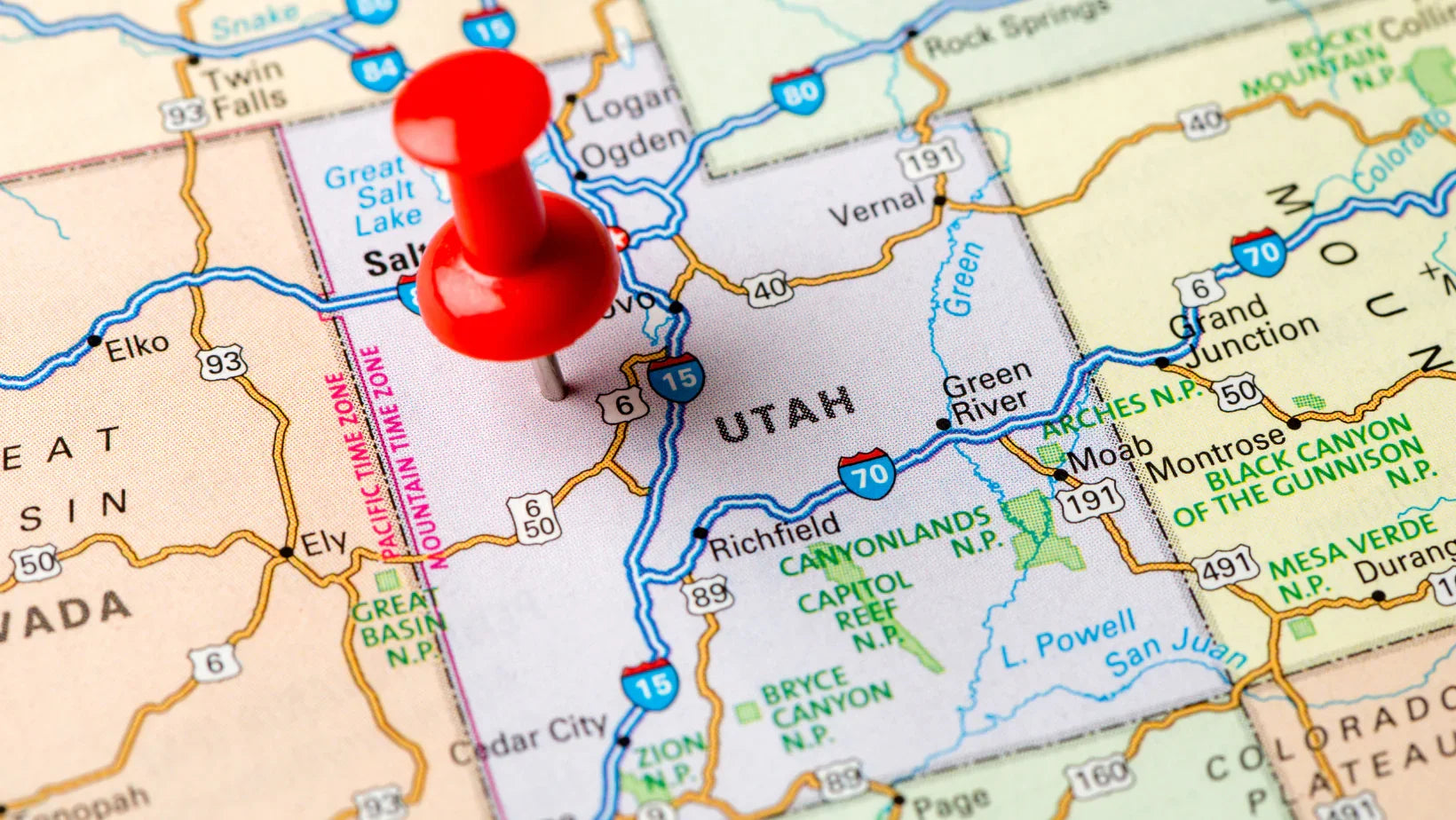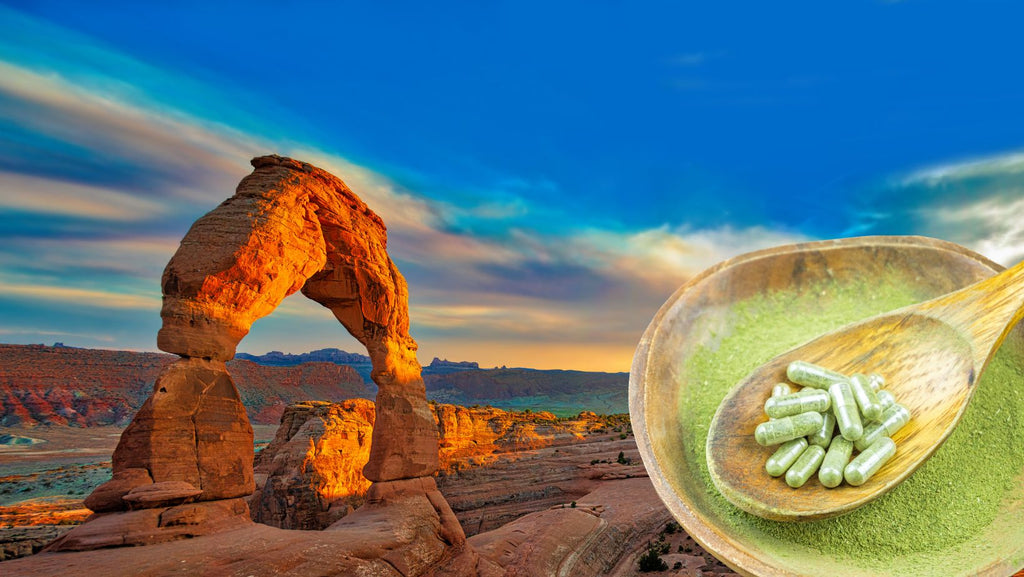
Is Kratom Legal in Utah? Full Facts
Explore the legality of kratom in Utah, including insights into the Kratom Consumer Protection Act and its impact on users and vendors.
Is Kratom Legal in Utah?
In Utah, Kratom is not only legal but also regulated under the Kratom Consumer Protection Act, making it one of the pioneering states to enact legislation aimed at ensuring the safety and purity of Kratom sold within its borders. This move reflects a proactive approach to protect consumers from adulterated and mislabeled products, setting a precedent for other states to follow.

The law mandates clear labeling, purity standards, and prohibits the sale of Kratom to minors. This regulatory framework underscores Utah's commitment to safeguarding its residents while acknowledging the potential benefits of Kratom for adult users.
The Legal Status of Kratom Across the United States
Kratom, a substance derived from a plant native to Southeast Asia, occupies a unique and often contentious position in the United States' regulatory landscape. Unlike substances like hemp, which was addressed in the 2018 Farm Bill allowing for its broader cultivation and sale, Kratom has not been included in such sweeping federal legislative changes.
Its legal status remains a patchwork of state-level regulations, reflecting a nation divided on how to approach this complex issue.

In the absence of federal scheduling by agencies such as the DEA, states have taken it upon themselves to legislate Kratom's legality. This decentralized approach has resulted in a spectrum of regulations, ranging from complete bans to age restrictions and requirements for purity and labeling under consumer protection laws.
The diversity in state-level regulation underscores the ongoing debate surrounding Kratom's risks and benefits, leaving consumers and vendors navigating a complicated legal environment.
Kratom Legality in Utah vs. Other States
Utah has emerged as a pioneer in the regulation of Kratom, adopting the Kratom Consumer Protection Act, which sets standards for the sale of Kratom products like Kratom Powders and Kratom Capsules within the state. This act mandates that Kratom sold in Utah must be labeled and free from adulterants, setting a precedent for responsible regulation aimed at protecting consumers without imposing an outright ban.
This approach contrasts markedly with the strategies adopted in other states, where the response to Kratom ranges from outright bans to more nuanced regulatory measures.
Some states have banned Kratom outright, categorizing it as a controlled substance akin to much harder drugs, for example:
This contrasts with the legal but regulated status Kratom enjoys in Utah, highlighting the significant discrepancies in how states perceive and manage the risks associated with Kratom use.
Meanwhile, states such as Florida and New York exhibit a middle ground, with Kratom legality varying by local jurisdiction, often with specific age restrictions or labeling requirements. These divergent approaches illustrate the complexity of regulating a substance that sits at the intersection of public health, safety, and personal freedom.
Comparison of Kratom Legality: Utah vs. Other States
|
State |
Legal Status |
Specific Regulations |
|
Utah |
Legal with Regulations |
Kratom Consumer Protection Act |
|
Alabama |
Banned |
Classified as a controlled substance |
|
Indiana |
Banned |
Classified as a controlled substance |
|
Wisconsin |
Banned |
Classified as a controlled substance |
|
Florida |
Legal (Varies Locally) |
Age restrictions in some counties |
|
New York |
Legal (Varies Locally) |
Proposed age restrictions and local bans |
Understanding Utah's Kratom Consumer Protection Act
Utah's Kratom Consumer Protection Act represents a significant step forward in the regulation and safety of kratom products within the state. Enacted to ensure that consumers have access to safe, pure, and accurately labeled kratom, the act sets forth specific requirements that vendors must meet to legally sell kratom.
This includes testing kratom for contaminants, clearly stating the product's ingredients and alkaloid content on the label, and adhering to age restrictions. By implementing these regulations, Utah aims to protect consumers from potentially harmful adulterated products and promote transparency within the kratom industry.
The Act not only safeguards the consumer but also legitimizes the use of kratom for vendors and users alike. It establishes a framework for responsible commerce and use of kratom, setting an example for other states to follow. With these regulations in place, consumers can feel more confident in the quality of kratom products they purchase, while vendors are held to a higher standard of accountability.
This proactive approach by Utah could pave the way for nationwide standards, contributing to the overall well-being of the kratom community and potentially influencing future legislation on kratom.
Key Points of Utah's Kratom Consumer Protection Act:
- Safety Testing: Mandatory testing for harmful substances.
- Labeling Requirements: Clear labeling of ingredients and alkaloid levels.
- Age Restrictions: Sales limited to individuals over the age of 18.
- Vendor Compliance: Vendors must register and comply with state regulations.
- Transparency: Encourages transparency in the sourcing and production of kratom.
- Consumer Confidence: Aims to boost consumer confidence in kratom products.
- Legislative Model: Serves as a legislative model for other states considering kratom regulation.
The Impact of Kratom Laws on Utah Residents
The implementation of Kratom laws in Utah has had a significant impact on residents, offering both protections and assurances. For consumers, the regulations mean access to safer, more reliable Kratom products, with reduced risk of exposure to adulterated or mislabeled items.

For vendors, the laws provide a clear framework within which to operate, promoting transparency and accountability in the Kratom market. This has not only helped to improve the quality of Kratom available in Utah but also contributed to a more informed and responsible consumer base.
Navigating Kratom Purchase Regulations in Utah
Purchasing Kratom in Utah requires understanding the state's specific regulations to ensure compliance. Here are key points to consider:
- Must be 18 or older: Buyers need to prove their age when purchasing Kratom.
- Look for compliant vendors: Vendors should adhere to the Kratom Consumer Protection Act.
- Check for labeling: Products must have clear labels indicating ingredients and purity.
- Beware of online purchases: Ensure online vendors comply with Utah's regulations.
- Seek quality: Opt for vendors who provide lab-tested Kratom.
- Understand the law: Be aware of what makes Kratom legal in Utah to avoid illegal products.
- Support reputable vendors: Supporting those who comply with the law ensures market standards remain high.
Navigating these regulations helps ensure that consumers can safely enjoy the benefits of Kratom while staying within the legal boundaries set by the state.
Shipping Kratom to & From Utah: Legal Guidelines
When engaging in the purchase or sale of kratom, whether you're looking to buy kratom online or through a physical kratom store, the importance of compliance with Utah's regulatory standards cannot be overstated. Utah has set a precedent with the Kratom Consumer Protection Act, which mandates specific standards for kratom purity and labeling, ensuring safety and transparency for consumers.
If you're in Utah and planning to ship kratom, or if you're outside the state considering ordering from a Utah-based online kratom store, familiarizing yourself with these standards is critical.
This attention to legal and quality standards not only protects you legally but also supports the integrity and reliability of the kratom market. By adhering to these guidelines, vendors and consumers can foster a safe, legal, and positive environment for the use and distribution of kratom.
Best Practices for Utah Residents Buying Kratom Online
Purchasing Kratom online can be a convenient option for Utah residents, but it comes with its own set of considerations to ensure safety and legality:
- Verify vendor compliance: Ensure the vendor follows Utah's Kratom Consumer Protection Act.
- Look for lab-tested products: Only purchase from vendors who offer lab results for their products.
- Read reviews: Check customer feedback to gauge product quality and vendor reliability.
- Understand return policies: Familiarize yourself with the vendor's return policy in case of issues.
- Compare prices: While price shouldn't be the only factor, it's worth comparing to ensure you're getting a fair deal.
- Check product variety: A reputable vendor usually offers a range of Kratom strains.
- Ensure secure payment options: Look for secure, encrypted payment methods to protect your information.
Following these practices can help Utah residents make informed and safe online Kratom purchases.
Ensuring Compliance: Kratom Vendors in Utah
Kratom vendors in Utah have a responsibility to ensure their products meet state regulations. This involves rigorous testing for purity and potency, accurate and transparent labeling, and adherence to age restrictions. By complying with these requirements, vendors not only protect their customers but also contribute to the legitimacy and sustainability of the Kratom market in Utah.
Compliance also means staying informed about legislative changes and public health guidelines related to Kratom. Vendors who prioritize safety and integrity can help foster a positive environment for Kratom use, benefiting both the industry and consumers.
Additionally, Utah kratom vendors must engage in ongoing education about kratom, both for themselves and their customers, ensuring that all parties are informed about the benefits, potential risks, and responsible use of kratom products. This commitment to education, coupled with strict compliance with regulations, sets a high standard for kratom retail in Utah and serves as a model for vendors nationwide.
It underscores the importance of a proactive approach in monitoring and participating in the legislative process, ensuring that the kratom community's voice is heard and considered in policy-making.
Advocacy and Future Legislation: The Path Forward for Kratom in Utah
The future of Kratom legislation in Utah will likely be influenced by ongoing advocacy efforts and emerging research on Kratom's benefits and risks.
As research evolves, so too might the legal framework around Kratom. Stakeholders, including lawmakers, health professionals, and the Kratom community, will need to engage in continued dialogue to balance public health concerns with individual freedoms and the benefits of Kratom.
Kratom and Public Health in Utah: Safety, Education, and Awareness
Kratom's legal status in Utah comes with a responsibility to promote public health through education and awareness. Efforts to inform consumers about safe Kratom use, potential effects, and how to identify quality products are crucial. Public health campaigns can play a key role in preventing abuse and ensuring that Kratom is used in a way that minimizes risks while maximizing potential benefits.
Educational initiatives could include workshops, informational websites, and community outreach programs, aiming to create a well-informed consumer base that understands both the potential benefits and risks of Kratom.
Legal Challenges and Success Stories: Kratom Advocacy in Utah
The path to Kratom's legal status in Utah has been marked by numerous challenges and successes. Advocates have worked tirelessly to educate lawmakers and the public about Kratom, countering misconceptions and highlighting its potential benefits. Success stories from individuals who have benefited from Kratom can be powerful tools in these advocacy efforts, providing real-world examples of how Kratom can positively impact lives.
Continued advocacy is necessary to protect and potentially expand Kratom access, ensuring that future legislation reflects the needs and experiences of Kratom users while addressing valid public health concerns.
FAQs: Kratom Legality in Utah Uncovered
Can I grow Kratom plants in Utah?
While it's legal to possess Kratom in Utah, growing Kratom plants might face practical challenges due to climate and legal ambiguities.
Are there limits on how much Kratom I can buy in Utah?
There are no specific limits on quantity, but vendors must comply with state regulations on sales.
Can I travel with Kratom through Utah airports?
Yes, but be aware of the laws in your destination.
Do Utah Kratom laws apply to online purchases?
Yes, online vendors selling to Utah residents must comply with state laws.
Is it legal to drive after consuming Kratom in Utah?
There are no specific laws against it, but impaired driving laws still apply.
Are there public places in Utah where Kratom use is banned?
Kratom use is not specifically banned in public places, but private businesses may have their own policies.
Can Utah change its Kratom laws in the future?
Yes, laws can change, so staying informed about legislative updates is important.
Share

